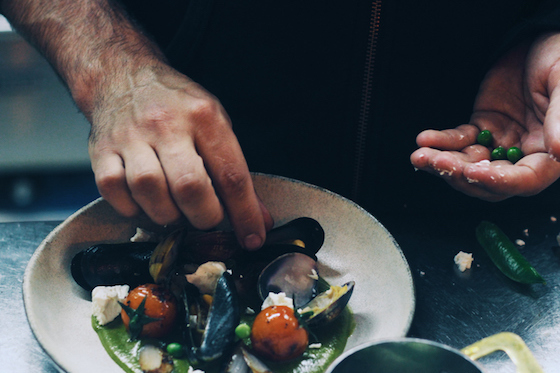Hilton Hotels has set an ambitious goal of buying 100% sustainably sourced seafood by 2022.
The goal divides the sustainable seafood into 25% procured from already sustainably certified sources and to invest in 75% of suppliers to get them certified – basically, to invest in farms and fisheries that are undergoing certification processes but aren’t yet fully sustainable. The first baseline progress report indicates a 6.6% progress toward the 25% goal and 3.9% progress toward the 75% goal.

(Contributed by Jeanette Hurt)
“Working with suppliers is an ongoing process,” says Sylvia Low, director of corporate responsibility.
It’s one that starts with determining what is sustainable and what isn’t.
“We have hundreds of seafood suppliers in multiple locations, and they do not always categorize their species the same way so that we can isolate the ones that belong in certification programs,” Low says. “It’s been a really time-consuming process to bring our suppliers on board to find some consistencies to map seafood sustainability across our system.”
Suppliers tend to be all over the map in terms of definitions of sustainability. “Some suppliers are already aware that it’s important, and they’re already on a journey themselves,” Low says. “In many parts of the world, they’re struggling with what exactly this concept means. In some places, it’s a seafood sustainability 101 conversation.”
In places like China and Malaysia, Hilton has been hosting supplier awareness workshops, and the company has come up with some guiding questions to ask suppliers.
“Just asking the right questions can’t be overstated,” Low says.
It’s better understood elsewhere. In the United Kingdom, for example, the company ran a competition for chefs about sustainable seafood, and two winners received an all-expenses-paid trip to a fish farm and fishery that was sustainably certified. “It was just a great morale boost for our team, and they got excited and told their peers,” she says.
Chefs, she says, are often the driving force behind sustainability efforts, and their enthusiasm carries over to diners as well as suppliers. It was their executive chef in Singapore, she says, who led to the hotel to be the first hotel in Asia to be certified by the Marine Stewardship Council and the Aquaculture Stewardship Council’s chain of custody certifications, which assure diners that the seafood on their plates is sustainably caught and farmed. The MSC is the leading certifier for wild-capture fishers, while the ASC is a leading certifier of seafood farms.
Suppliers need to understand that sustainable certifications can lead to more profits. “It depends on whether suppliers see the commercial viability of moving toward a more sustainable operation,” Low says. In Singapore, the hotel facilitated conversations between suppliers and other buyers, including hotels and restaurants, about the importance of sustainability.
“We’ve seen a tripling in the number of suppliers being certified,” she says of the effort. “And this wasn’t because it was necessarily the right thing to do. It was primarily that they could see the business opportunity.
”It’s also important for hotels to see the financial viability, she says, as sustainably sourced seafood often costs more. To determine diners’ preferences, Hilton started marking on some of its hotels’ menus which items were sustainably sourced. “We consistently see our sustainably certified seafood items become bestsellers,” she says.
